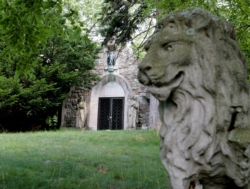Family seeks to block relocation of cardinal’s tomb
BRAINTREE -- Heirs of the late Cardinal William O’Connell, who was Archbishop of Boston from 1907 to 1944, have officially filed a challenge to a petition to move Cardinal O’Connell’s remains from property now owned by Boston College.
On Nov. 25, 22 descendants of Cardinal O’Connell filed a challenge to a petition jointly filed by the Archdiocese of Boston and Boston College with the Probate and Family Court of the Commonwealth of Massachusetts seeking to disinter the late cardinal’s remains and move them to St. Sebastian’s School in Needham, which Cardinal O’Connell helped found in 1941. The petition to relocate is required by state law.
“We appreciate the opportunity to review the newly-filed court documents, which we will do in the days ahead. Our position remains the same in that we believe we have presented and developed an appropriate and dignified plan for the establishment of a permanent resting place for the late cardinal on the campus of St. Sebastian’s School in Needham,” said Terrence Donilon, the archdiocese’s spokesman. “The Archdiocese is committed to providing a resting place that is befitting an archbishop and we believe that the St. Sebastian’s campus achieves that goal especially when you consider the important role the late cardinal played in establishing the school.”
In his will, the late cardinal states his intention to be interred in the chapel, on what was then St. John’s Seminary property, according to the document filed with the probate court by the O’Connell family.
However, in 2004, the archdiocese sold the property, including surrounding acreage, to BC with the agreement to move Cardinal O’Connell’s body. The property sold for over $99 million, according to the court document filed by the O’Connell family. St. John’s Seminary is still archdiocesan property.
The challenge document contains an excerpt from the sale agreement between the two parties that says the archdiocese is to pay for the disinterment. The archdiocese also has “the right, but not the obligation” to move the mausoleum surrounding the remains as well. Also according to the sale agreement, BC was to withhold $2 million to be given to the archdiocese upon removal of the late Cardinal’s tomb.
BC recently won city approval to develop the area as the school’s Brighton campus. In a Sept. 25 article in the Pilot, the school said it plans to build a parking garage on the site of Cardinal O’Connell’s burial place.
Edward Kirk, great-nephew of Cardinal O’Connell, a Centerville attorney, opposes the actions of the archdiocese and the college.
He contends that because the archdiocese no longer owns the land on which his great- uncle is interred, they have no right to request that the probate court allow disinterment.
“We would say that if they don’t have property rights in the land itself, they surely don’t have any rights to stand before the court and ask the court to allow removal of a body from someone else’s land.”
Kirk also said that BC is violating his great-uncle’s wishes.
“I don’t know of any other situation where a person had made his wishes so clearly known on many occasions as he did,” Kirk said. “The whole purpose was to be adjacent to the seminary.”
It was O’Connell who, during his tenure as archbishop, moved the archdiocese’s headquarters from Boston to Brighton.
Cardinal O’Connell had repeatedly stated his wishes to be buried on the Brighton site. He is buried in a concrete vault beneath the marble floor at the foot of the altar in the Chapel of the Blessed Virgin Mary, constructed in 1928.
“As expressed in his last will and testament in 1944, his written statements in 1928, and his selection of the site in 1906, it was the cardinal’s intention to be buried in the Chapel of the Blessed Virgin because of its proximity to the institution of St. John’s Seminary, a circumstance which has remained unchanged since its interment in the Chapel in 1944,” the defendants assert in their challenge document.
The defendants claim that their ancestor constructed the chapel “for the particular purpose of serving one day as his burial crypt.”
Kirk’s brother, current U.S. Senator Paul Kirk (D-Mass.) is not named as a defendant and the senator’s office declined to comment on the matter.
Edward Kirk said that legal proceedings will begin in February.



















